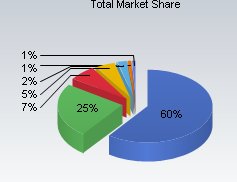Why the fall of Explorer matters


Firefox now definitely has a place at the table, with nearly 25%, while Google Chrome leads a second tier of Safari and Opera on 6.73%. Starcounter reportedly has it even closer, with Explorer down to 51% and Firefox nearing 33%.
(The image is from Net Applications. I tweaked it a little to fit the page.)
Yes, it does sound faintly political, and that's the point. Market share in this case is a form of political power, and what is at issue is the future of the Web.
Consider the question of video codecs. The idea of an open source codec would not be open if Firefox were not such a player in browsers. Since it is a player its support of Ogg Theora matters, while Microsoft's decision to go only with H.264 matters less.
Or consider mobile. Here the game is the same. Apple supports Sproutcore for mobile web apps. But the force is strong with Google, and its support of Flash means Apple can't have it all its own way.
Or consider security. Explorer's reported interference with Firefox would be Mozilla's problem if Microsoft market share were closer to 90%. Now disgruntled users have a viable option, and the problem of blocking .exe files is in Redmond's lap.
Standards questions under HTML5 are supposed to be negotiations, high level discussions about technical excellence. In fact they are political struggles, and thus browser share data acts like poll numbers, giving strength to those who are gaining. (The battle over health reform has nothing on HTML5, whose 2007 working group will serve through the end of 2010.)
So whether you use Explorer, Firefox, Chrome, Safari or even Opera matters less than the fact that you actually have a choice. Which means you also have a choice on key technologies supporting your browser. The market is producing a political stalemate, and in this case that's a good thing.